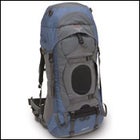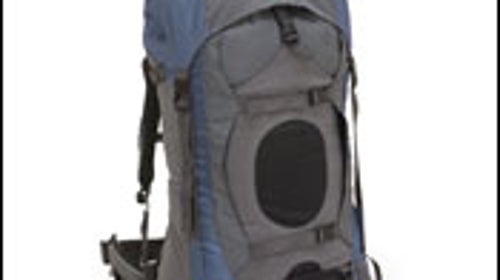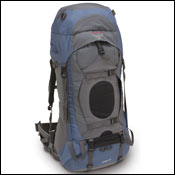A 4,500-cubic-inch pack? For Mount Shasta?? In the summer?!? I dunno what to say. If youve signed on with a guide service then youre under some obligation to equip yourself per their instructions. But that seems excessive, even allowing for the fact that needed gear is needed gear, and it doesnt matter if youre 51″ or 71″. I mean, lets be realistic, ten years ago maybe 4,500 cubic inches would have been mandatory, but for the most part gear today is lighter and packs down more easily than gear back then.
Osprey Ariel 65 Backpack
 Ariel 65 Backpack
Ariel 65 BackpackI think a pack in the 3,500- to 4,000-cubic-inch range is perfectly adequate. Ospreys Ariel 65 ($239; ospreypacks.com) would be ideal. Its a compact 4,000-cubic-inch pack, specifically designed for women. The Ariel is a lightweight (just over four pounds) top-loader that has an excellent suspension for loads up to 40 pounds or so. Particularly appealing is the hip belt, which can be custom-molded at most retail shops that carry Osprey packs. And it has a bottom compartment for sleeping bags and stuff.
I also like Gregorys Deva 60 ($249; gregorypacks.com), another womens-specific pack. Its a bit smaller than the Osprey pack, but with 3,600 cubic inches of space, it still has room for plenty of gear. Its a little heavier than the Osprey (five pounds, six ounces), but that translates into a little tougher construction, such as a rubber-like coating on the pack bottom. You might also like the fact the Deva has a top-loading design, but adds a bottom compartment and the ability to access stuff from the back of the pack.
As for a sleeping bag, a 20-degree bag should be perfectly adequate. If you sleep cold, just be sure to wear some long underwear, hat, and gloves to bed. And why do you prefer synthetic over down? Down is lighter and more compressible. Feathered Friends Swallow ($344; featheredfriends.com) is the perfect bag for this junket. It weighs two pounds, is rated conservatively to 20 degrees, and is a bag that will last the rest of your life. If youre set on synthetic, Marmots EcoPro ($165; marmot.com) is rated to 15 degrees, uses (mostly) recycled materials, and isnt too heavy or bulky at two pounds, 13 ounces.
Have fun!
The 2008 Winter Outside Buyers Guide is now online. From snow sports to trail-running to camping, get reviews of more than 300 new gear must-haves.


